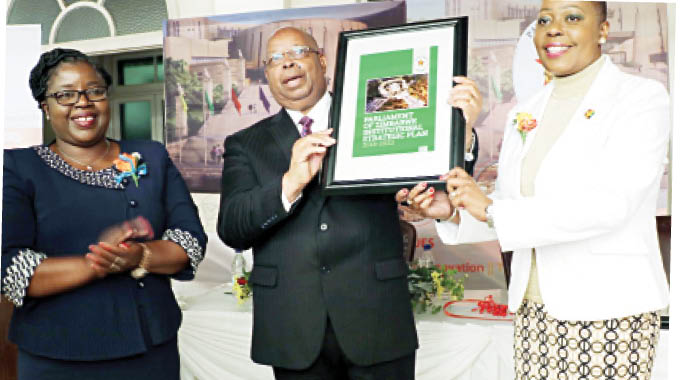Parliament of Zimbabwe epitomised by evolution and innovation

The Parliament of Zimbabwe is epitomised by evolution and innovation. Immediately after Independence the institution deliberately embarked on a new recruitment trajectory that ensured the integration of war veterans and affirmative action and advancement to reflect the new political situation. There was a change in nomenclature of designations of personnel to ensure dignity and respectability of some positions. The designation messenger was changed to office orderly, night watchmen to security officer and door keeper to house keeper. In order to eliminate duplication of service among departments, a job evaluation abolished 20 departments and created 7 headed by Deputy Clerk’s and Principal Directors.
The 1998 Reform Programme ushered in a new era that set up the Committee System. The reforms saw the recruitment of highly competent and professional staff capable of delivering quality and effective service. This was complemented by the extensive use of information and communication technology in all its operations.
In its quest to continually innovate in 2000, the Parliament of Zimbabwe adopted the five year strategic planning cycle to guide the implementation of the reform programme. The strategic planning cycles are aligned to life of each Parliament for ease of planning and implementation.
The Parliament of Zimbabwe is now in its fifth 5 year planning cycle. The aim of the strategic plans has been the quest to promote coordinated quality services to Members of Parliament and other stakeholders.
In order to further strengthen the Reform process the Parliament of Zimbabwe on 5 September 2015 earned certification under ISO 9001:2008 Standard. It has since transitioned and on 3 December, 2018 got certified under the ISO 9001:2015 Standard. The International Organisation for Standardisation (ISO) 9001:2015 is the most updated of its kind that focuses on quality management systems and performance. This standard has assisted Parliament of Zimbabwe to develop a management system that aligns quality with its institutional strategic plan (2018-2023). There is focus on risk-based thinking and accountability in all organisational processes and this helps improve communication, efficiency and the implementation of continuous improvement.
Quality is defined as “the totality of factors and characteristics of a product or service that bear its ability to satisfy stated and implied needs”. According to Aristotle “Quality is not an act but a habit” In order to transform acts to habit the organisation needs to develop character which according to Austin Zvoma the former Clerk of Parliament, “Character is behaviour over time”.
Indeed in 2008, Parliament took an initial decision to seek ISO Certification as part of its 2008-2011 Institutional Strategic Plan. Not much was done between 2008 and 2009 due to national economic challenges and uncertainty on how to proceed. A decision was finally made in 2010 with advice from Mr. Brian Musarurwa a renowned Quality Management expert, to immediately embark on ISO Certification. Though the process was arduous and energy draining Parliament of Zimbabwe was certified in September 2012. The immediate results of this process were:
1. Consistency in providing services to Members of Parliament and other stakeholders
2. Easy to follow policies and procedures
3. Easy integration of new staff
4. Continual improvement of the effectiveness of the system
5. Employee involvement in setting up and implementing quality objectives. 6. Improved Communication in the organisation
In order to achieve the certification, Parliament ensured:
a) Staff involvement at all levels
b) Exposure of all staff to the ISO Standard and its benefits.
c) Training of internal Auditors
d) Carrying out regular audits
e) Preaching the gospel of continual improvement
f) Communication of changes to staff first before implementation.
The challenges faced were embraced and dealt with positively. There was resistance from some quarters of the institution; new staff were confused at the beginning. There was also a perception that the quality management system was rigid and record keeping proved a challenge.
In September 2015, ISO released the mandatory ISO 9001: 2015 standard to which all organisations certified under the 2008 Standard were to transition before end of September 2018. In response, Parliament under the leadership of the Clerk transitioned to the new standard and was certified on 4 September 2018. Parliament was excited to earn this certification and it felt it provided additional assurance to its customers that it is focused on continuous improvement and customer satisfaction. Its move from ISO 9001:2008 to the updated 2015 standard demonstrates its desire to always perform at the highest level of quality and efficiency. As already highlighted, it is essential to continuously deliver innovative, high quality and customer focused service to our customers.








Comments